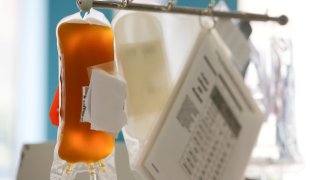
- The NIH halted a trial testing convalescent plasma in patients with mild-to-moderate COVID-19 symptoms after an independent group concluded it was unlikely to be beneficial.
- Scientists and public health officials had previously said they were skeptical convalescent plasma was an effective treatment for patients with COVID.
- In January, REMAP-CAP, an international clinical trial exploring potential treatments for COVID, halted its study testing convalescent blood plasma after trial investigators found no benefit.
The National Institutes of Health said Tuesday it halted a trial testing convalescent plasma in patients with mild-to-moderate COVID-19 symptoms after an independent group of experts concluded it was unlikely to be beneficial.
The independent data and safety monitoring board met on Feb. 25 to review the data and determined that while the plasma treatment caused no harm, it was unlikely to benefit this group of patients, the NIH said in a release. After the meeting, the DSMB recommended that the NIH stop enrolling new patients into the study, the agency said.
Scientists and public health officials had previously said they were skeptical convalescent plasma was an effective treatment for patients with COVID, even after the Food and Drug Administration issued an emergency use authorization for the treatment in August and former President Donald Trump touted it as a "breakthrough."
Get a weekly recap of the latest San Francisco Bay Area housing news. Sign up for NBC Bay Area’s Housing Deconstructed newsletter.
At the time, Dr. Scott Gottlieb, a former FDA commissioner, said the treatment might help patients but it "doesn't look like a home run." He did agree that convalescent plasma "certainly" met the standard for an emergency use approval "in the setting of a public health emergency."
The plasma, which is taken from patients who have recovered from COVID-19 and developed antibodies against the virus, is infused in sick patients. Scientists had hoped it would help kick-start the immune system in those patients to fight the virus.
In January, REMAP-CAP, an international clinical trial exploring potential treatments for COVID, halted its study testing convalescent blood plasma after trial investigators found no benefit. The decision by the REMAP-CAP came after an initial analysis of more than 900 severely ill trial participants in intensive care showed that the treatment with the product did not markedly improve patient health.
Money Report
The NIH trial was conducted at 47 hospital emergency departments across the United States and had enrolled 511 of the 900 participant recruitment goal. After the study participants received either the plasma or a placebo, researchers tracked whether the participants needed to seek further emergency or urgent care, had to be hospitalized, or died within 15 days of entering the trial.






